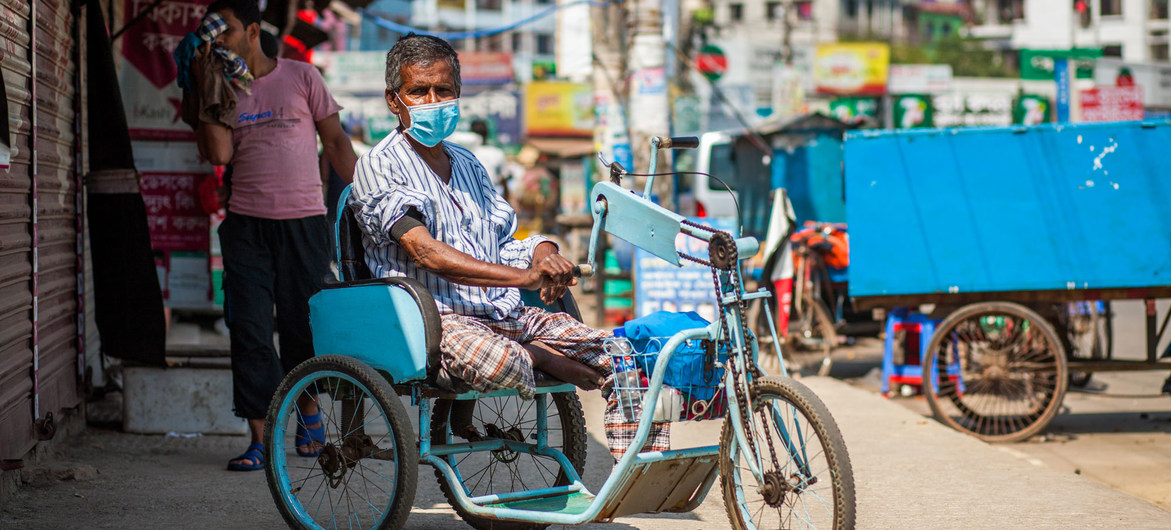 COVID19
COVID19
Coronavirus ‘starkly’ exposes vulnerability of persons with disabilities
New York: The COVID-19 pandemic has “starkly exposed” the heightened vulnerability and risks to persons with disabilities, a major meeting convened to discuss the international treaty that supports persons with disabilities, heard on Monday.
In the first online session for the Committee on the Rights of Persons with Disabilities, Ibrahim Salama, head of the Human Rights Treaties Branch in the Office of the High Commissioner for Human Rights (OHCHR) lauded the treaty body, which, despite significant challenges posed by the virus, have done “extraordinary work” to implement their mandate.
Speaking on behalf of the Secretary-General and the UN human rights chief, he commended their work in focusing on the rights of persons with disabilities in the context of COVID-19.
Procedural developments
Mr. Salama updated the meeting that the mandates of the Special Rapporteur on the rights of persons with disabilities and on the Elimination of discrimination against persons affected by leprosy, had been extended for a period of three years.
Moreover, nine UN entities had been working collaboratively to support disability inclusiveness on COVID-19 response and recovery at the national level.
Treaty body review
The OHCHR representative also informed the committee that the 2020 review of the treaty body system was launched on 2 June, where UN High Commissioner Michele Bachelet highlighted the need for “better digital tools” to strengthen treaty bodies’ accessibility, including for persons with disabilities, said Mr. Salama.
“The High Commissioner stated that the COVID-19 pandemic presented an opportunity to rethink and expand working methods to have more impact and visibility on the ground, while addressing the need for language interpretation and other technical challenges of working online”, he added.
According to the OHCHR representative, Ms. Bachelet maintained that the pandemic “presented an opportunity to rethink and expand working methods to have more impact and visibility on the ground”, while also “addressing the need for language interpretation and other technical challenges of working online”.
Need to uphold rights, ‘greater than ever’
The Treaties Branch head informed that during a virtual meeting at the end of July, the Chairs stressed that “in this time of unprecedented global crisis, the need to uphold human rights is greater than ever”.
They called on States and the Secretary-General to “fully support the work of human rights treaty bodies and to enable them to exercise their mandates to the maximum extent possible in the coming months”, stated Mr. Salama.
Against the backdrop of having to work online since March, the committee Chairs discussed with Deputy High Commissioner for Human Rights, Nada Al-Nashif, the challenges they are facing.
However, until they can resume face-to-face sessions, the Chairs decided that the COVID -19 Working Group of treaty body members should continue to focus on the practical impact of the virus on human rights.
Explore technology
Others also made contributions, including the Chair of the Human Rights Council Taskforce for the accessibility for persons with disabilities, Socorro Flores Liera, who maintained that “increased reliance on technology opens up new avenues for accessibility” and that they should be “better explored”.
The Director of the UN Office for Disaster Risk Reduction (UNDRR), Ricardo Mena, acknowledged, “we are very much aware that much more needs to be done to ensure that persons with disabilities are included in disaster planning and that their inclusion and participation is monitored and well supported”.
And the President of the International Disability Alliance, Ana Lucia Arellano, urged State parties to “work hand-in-hand with persons with disabilities and their representative organization as well as with allies from other civil society organizations in the design and implementation of public policies”.
Support Our Journalism
We cannot do without you.. your contribution supports unbiased journalism
IBNS is not driven by any ism- not wokeism, not racism, not skewed secularism, not hyper right-wing or left liberal ideals, nor by any hardline religious beliefs or hyper nationalism. We want to serve you good old objective news, as they are. We do not judge or preach. We let people decide for themselves. We only try to present factual and well-sourced news.







